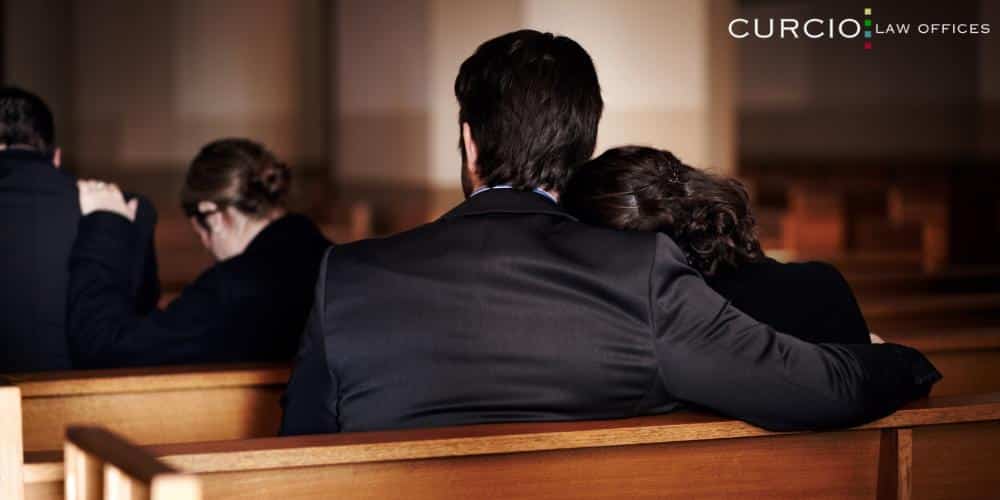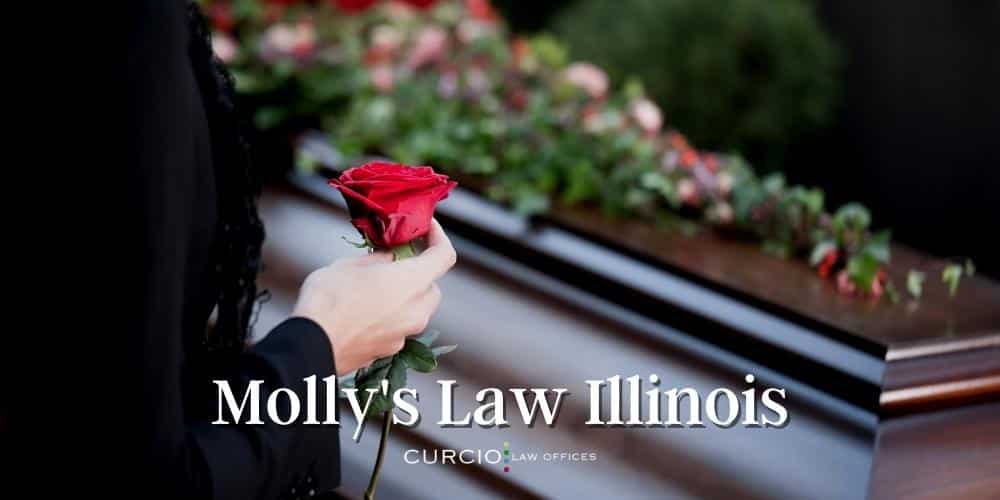Surviving family members file wrongful death lawsuits when their loved ones are killed through negligent and/or criminal acts. People may file these civil lawsuits after motor vehicle accidents (such as a car accident), medical malpractice incidents, premises liability accidents, and violent intentional conduct. Wrongful death lawsuits allow a surviving parent, child, or spouse to receive financial compensation for a variety of damages such as medical bills, lost wages, mental suffering, and so much more. There is a catch: family members must file a wrongful death claim before the Illinois statute of limitations expires. If they don’t, their case will be dismissed. Filing a lawsuit within a tight window of only two years can be nearly impossible, especially when the victim was murdered. That’s why Molly’s law was passed in 2016. The law extends the wrongful death statute of limitations in Illinois for victims of violent crimes. We explain this and more below.
If your loved one died due to a wrongful act or intentional conduct, you may have grounds to file a wrongful death claim. A Chicago wrongful death lawyer at Curcio & Casciato can help you determine if you have a strong case and defend your legal rights during this impossible time. Call 312-321-1111 to schedule a free consultation with our legal team today.
What is Wrongful Death?
Wrongful death occurs when a person suffers an untimely death due to someone else’s negligent actions or inactions. Surviving family members can file a wrongful death suit in order to obtain financial recovery from the responsible party.
Wrongful death claims are very similar to personal injury claims. The goal is to recover compensation in order to restore the victim’s life to its pre-accident state. The only difference is, of course, the victim in a wrongful death case is a deceased person. On the other hand, the victim in a personal injury claim is obviously still alive, but usually severely injured or disabled.
Common Causes of Wrongful Death
A variety of accidents and incidents can warrant a wrongful death action, including:
- Motor vehicle accidents such as car accidents, truck accidents, pedestrian accidents, bicycle accidents, and motorcycle accidents.
- Medical malpractice incidents like birth injuries, medication errors, diagnostic errors, chiropractor malpractice, plastic surgery malpractice, etc.
- Construction accidents
- Slip and fall accidents
- Amusement park accidents
- Product liability violations
- Train accidents
- Aviation accidents
- Violent intentional conduct such as first/second/third degree murder, voluntary manslaughter, involuntary manslaughter, and any kind of intentional homicide (reckless homicide, drug induced homicide, etc.)
Wrongful Death Claim vs. Criminal Homicide Case
It’s important to note that the exact cause of the person’s death will determine what type of claims the responsible party can face. If a negligent or wrongful act caused the death, the negligent party can face a civil lawsuit brought by family members of the deceased person. But if the death was caused by a violent or intentional act, the responsible party can face criminal charges along with a civil lawsuit brought by the family members.
A criminal case can result in prison time, hefty fines, and a tainted criminal record. Meanwhile, a wrongful death case in civil court can provide financial compensation to surviving family members on behalf of the deceased person. The last major difference between wrongful death claims and criminal prosecution is how liability is determined. In a criminal case, the defendant must be proven guilty “beyond a reasonable doubt” in order to receive a conviction. Meanwhile, civil liability is generally proven through a “preponderance of the evidence.” This basically means that the defendant likely caused the wrongful death.
Who Can File a Wrongful Death Claim in Illinois?
Most states allow the surviving spouse and minor children to file this type of civil lawsuit. However Illinois law (740 ILCS 180/2) specifically states that only the personal representative (AKA: the executor) of the deceased person’s estate can file a wrongful death lawsuit.
If a person dies before they appoint an executor to their estate, then the court will appoint one for them. This court-appointed personal representative is responsible for filing a wrongful death lawsuit on behalf of the deceased person (if they so choose) and handle all other affairs relating to the decedent’s estate.
This can be an overwhelming task for anyone, especially while enduring the grieving process. If you’re considering a wrongful death action but you have no idea where to begin (especially alongside other estate responsibilities) a Chicago wrongful death lawyer at Curcio & Casciato can help. We have decades of combined experience in handling both personal injury cases and wrongful death cases. We can help you determine if you have grounds to file a wrongful death claim and walk you through the entire legal proceeding. Allow us to help you pursue justice and compensation for the loss of your loved one’s life.
What is Molly’s Law?
Molly’s law is an Illinois law passed in July 2016 which amends the statute of limitations for wrongful death cases.
About the Death of Molly Young
21-year-old Molly Young of Carbondale, IL was found dead on March 24, 2012 in the apartment of her ex boyfriend – Richie Minton. She died of a gunshot wound to the head, and more than 10 years later, the coroner and the local police still don’t know for sure whether she died of suicide or of murder. Her family has always believed that she was murdered.
Shortly after Molly’s death, her father Larry Young tried to request more information about the details surrounding her death. Because the processing of his Freedom of Information Act (FOIA) requests took far longer than expected, Larry Young’s wrongful death lawsuit against Richie Minton was dismissed because the two year statute of limitations had expired.
Over the next several years, Larry Young fought to change how FOIA requests are processed. He also advocated for an extended wrongful death statute of limitations in Illinois. Young was successful in extending the wrongful death statute of limitations in Illinois. Thus, Molly’s law was born. Illinois Governor Rauner signed the bill (HB 6083) into law on July 19, 2016.
Wrongful Death Statute of Limitations in Illinois
The wrongful death statute of limitations in Illinois is two years from the day of the person’s death. Since the passing of Molly’s law in 2016, the statute of limitations for wrongful death lawsuits in Illinois has been extended for death caused by violent intentional conduct. The family of a murder, homicide, or manslaughter victim can now file a wrongful death claim within five years of their loved one’s death.
Additionally, a person can file a wrongful death lawsuit one year after completed criminal prosecution if the defendant received any of the following charges/convictions:
- First or second degree murder
- Voluntary manslaughter/intentional homicide of an unborn child
- Reckless homicide/involuntary manslaughter of an unborn child or any other victim
- Drug induced homicide
If surviving family members fail to file a wrongful death case within these time limits, it will be dismissed. That’s why it’s so important to consult with a Chicago wrongful death attorney at Curcio & Casciato as soon as possible. Legal proceedings can take a long time to investigate and process. You don’t want to wait too long to start pursuing justice for your loved one because the statute of limitations may expire. Allow us to help you get your case moving.
Damages for a Wrongful Death Claim
A successful wrongful death lawsuit can recover financial compensation for the following types of damages:
- Medical expenses
- Lost wages (for the surviving spouse, parents, siblings, and/or children of the deceased, depending on who files the wrongful death case)
- Loss of financial support (especially if the deceased was the breadwinner of the household/family)
- Funeral and burial expenses
- Non economic damages such as emotional distress and loss of consortium

Call Chicago Wrongful Death Lawyers at Curcio & Casciato Today
If your loved one’s death was caused by negligent and/or criminal acts, you may have grounds to take legal action against the at-fault party. A Chicago wrongful death attorney at Curcio & Casciato can help you determine whether you have grounds to file a wrongful death claim as well as help you gather evidence to prove the at-fault party’s liability. We know that the grieving process is all consuming after a tragic death. Allow us to help you pursue justice and a fair settlement on behalf of your deceased loved one and your family. Call 312-32-1111 to schedule a free consultation with our legal team today.



